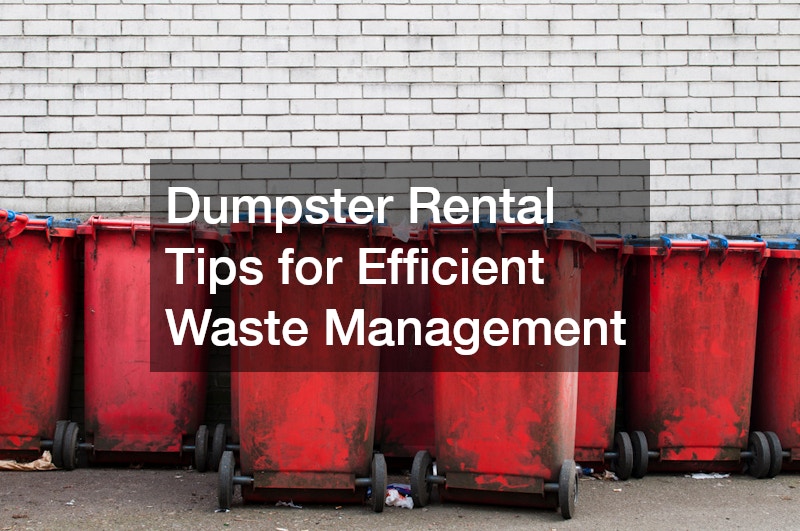Dumpster Rental Tips for Efficient Waste Management

In this article, we will explore essential tips for renting a dumpster and efficiently managing waste. Whether you’re embarking on a home renovation, a construction project, or a major cleanup, proper waste management is crucial. Using a dumpster rental service can simplify the waste disposal process, making it both efficient and environmentally responsible.
How to Choose the Right Dumpster Size
Assessing Your Project Needs
Before renting a dumpster, consider the nature and scope of your project to determine the type and volume of waste it will generate. Whether you are dealing with construction debris, household junk, or landscaping waste, each category has different volume requirements.
Accurately assessing these needs is the first critical step in selecting the right dumpster size.
Understanding your project’s waste profile can prevent unnecessary expenses by avoiding oversized or undersized rentals. An oversized dumpster may lead to increased costs, while an undersized one might necessitate additional hauls. Thus, estimating the quantity of waste is vital to ensure efficiency.
Detailed planning regarding the waste type and volume can also influence the type of service you opt for. For instance, some rental companies offer specialized containers for specific waste types, which can be more cost-effective. Consultation with industry professionals can enhance the accuracy of your estimations.
Understanding Dumpster Sizes
Dumpsters come in a range of sizes, from small for minor cleanups to large for major renovation projects. Common sizes include 10-yard, 20-yard, 30-yard, and 40-yard options, each suitable for different scales of waste. Knowing these sizes and their typical uses will help you make an informed decision.
A 10-yard dumpster, for example, is ideal for small garage cleanouts or minor landscaping tasks, while a 40-yard dumpster suits large-scale construction projects. Matching the dumpster size to your project helps manage costs and logistical considerations effectively.
It’s essential to ensure that the selected dumpster can comfortably hold the waste volume you anticipate. Overloading a dumpster might lead to safety hazards and additional charges. Hence, understanding the available sizes and their capacities is an essential part of the rental process.
Consulting with Rental Companies
Engaging with dumpster rental companies can provide valuable insights and recommendations tailored to your specific needs. These professionals possess the expertise to advise on the most suitable dumpster size and type for your project. Their guidance can simplify decision-making and enhance efficiency.
It’s beneficial to discuss specifics like the waste composition and project duration with rental companies. They can suggest the appropriate rental period and any additional services that might be required to handle particular waste types. The consultation process can also highlight any regulatory considerations pertinent to your area.
Best Practices for Efficient Waste Disposal
Sorting Waste Materials
Implementing a waste sorting system is crucial for effective and efficient disposal. By categorizing materials into recyclables, hazardous waste, and general trash, you can optimize recycling and responsible waste management. This practice not only benefits the environment but can also reduce overall disposal costs.
Materials such as metals, plastics, and paper are often recyclable and should be separated from general waste. Hazardous materials, such as chemicals or electronic waste, require special handling and may need to be disposed of separately. Proper segregation minimizes the amount of waste that ends up in landfills and supports recycling initiatives.
Effective sorting involves educating your team or household members involved in the project about the types of waste that can be recycled or need special handling. Providing clearly labeled containers can facilitate this process and ensure everyone follows the sorting guidelines. This habit of segregation maintains consistency in your waste management approach.
Maximizing Dumpster Space
Efficient packing of your dumpster can significantly maximize the available space, reducing the need for additional rentals. Begin by breaking down larger items and placing heavier materials at the bottom to create a stable base. Doing so can create more room for lighter, bulkier items on top.
Strategic placement of items can also help distribute weight evenly, preventing issues during transport. Filling gaps with smaller debris can further optimize space use and minimize air pockets. Overall, maximizing your dumpster space allows for more efficient and cost-effective waste disposal.
In addition, consider timing your waste disposal process to coincide with peak availability or lower demand periods for rentals. This approach can sometimes result in cost savings and improved service from the rental company. Efficiently using dumpster space is an integral part of strategic waste management.
By applying these dumpster rental tips, you can achieve efficient waste management for your project. Proper planning, sorting, and choosing the right dumpster size can help streamline the waste disposal process, minimizing environmental impact and maximizing efficiency. With the right approach, you can complete your project smoothly while adhering to all necessary environmental and regulatory guidelines.
.







